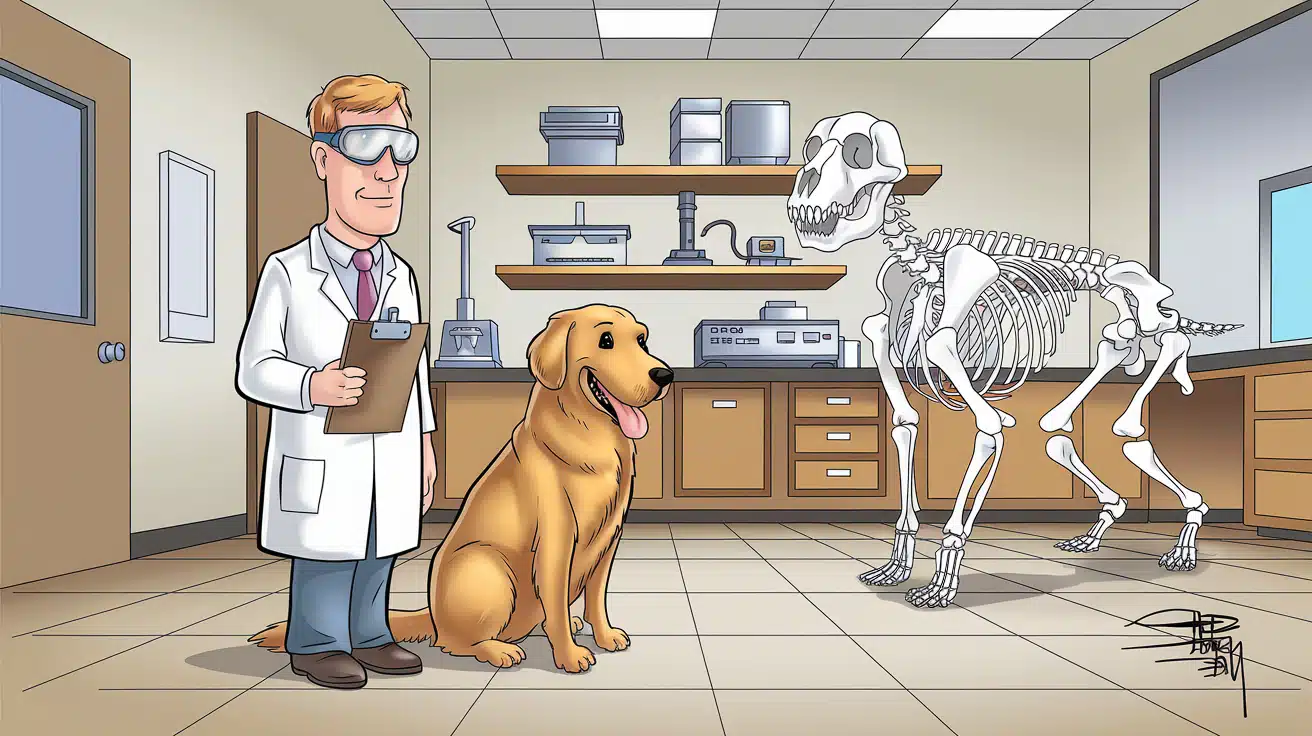Golden Retrievers’ Lifespan Research. Golden Retrievers are cherished companions known for their loyalty and friendliness, but they also face a significant health challenge. Research highlights that Golden Retrievers have up to a 65% chance of dying from cancer, making their lifespan a crucial area of study.
Understanding the risks and factors affecting their longevity is not just important for pet owners but also advances veterinary medicine as a whole.

The ongoing Golden Retriever Lifetime Study is tackling these challenges by exploring genetic, environmental, and lifestyle factors that contribute to diseases in these dogs.
This decade-long research is a beacon of hope for improving their health and lifespan. It also serves as a foundation for potentially life-changing breakthroughs in disease prevention.
Recent studies have uncovered promising findings, such as the discovery of a gene variant linked to longer lifespans in Golden Retrievers.
This groundbreaking research matters because it not only addresses Golden Retrievers’ health but may also unlock new paths for extending the lives of beloved pets across species. Who wouldn’t want their furry friend to stay by their side a little longer?
Golden Retrievers’ Lifespan Research
Golden Retrievers are cherished for their friendly nature and loyalty. They typically live between 10 and 12 years, but there are instances where they can live up to 15 years with proper care.
This lifespan is influenced by factors such as genetics, diet, and healthcare.
The Golden Retriever Lifetime Study is one of the largest and longest canine health studies ever conducted. It aims to improve the longevity of these beloved dogs by researching how environmental factors affect their health over time.
Have you ever wondered why some Golden Retrievers live longer than others? The quality of care they receive plays a huge role.
Regular exercise, a balanced diet, and routine veterinary check-ups can enhance their survival rate significantly.
Consider a family whose Golden Retriever reached the age of 14. They dedicated time to provide their pet with regular walks and healthy meals, reflecting the impact of their commitment on the dog’s remarkable age.
Why is it crucial to understand these factors? It empowers Golden Retriever owners to make informed decisions that could extend their dogs’ lives.
While genetic factors are unavoidable, lifestyle choices can be altered to favor longevity.
By paying attention to these aspects, Golden Retriever owners can help their pets live longer, happier lives. Understanding their lifespan isn’t just about lengthening life but also about enhancing the quality of time spent together.
Genetic Contributions to Lifespan

Golden Retrievers have been the focus of studies investigating the impact of genetics on lifespan. These studies uncover how certain genetic factors, including specific gene variants, contribute to the health and longevity of this beloved breed.
Role of Genetic Variants
Golden Retrievers’ lifespans are influenced by specific genetic variants.
Researchers have uncovered a gene, HER4, that’s linked to longer lifespans in some dogs.
Dogs carrying certain variants of this gene tend to live longer. This discovery offers hope not only for Golden Retrievers but could impact canine health in general.
In recent studies, variants associated with longevity were more prevalent in dogs living past 14 years compared to those who passed before age 12.
Such findings help scientists explore ways to improve health and extend life spans.
By contrasting DNA from long-lived dogs with others, they aim to identify protective genetic factors that may prevent common diseases, such as cancer.
Investigation into DNA and Longevity
Investigating DNA sequences plays a vital role in understanding lifespan in Golden Retrievers.
Scientists focus on genetic code spots that might affect how long these dogs live.
UC Davis recently made strides in genetic research by pinpointing the 5′UTR of ERBB4 gene as a player in lifespan duration.
By diving deep into the genetic makeup of these dogs, researchers hope to answer key questions about canine longevity.
For example, could changing certain DNA sequences extend a dog’s life?
Insights from such studies may pave the way for improving dogs’ quality of life worldwide and addressing common health challenges in the breed, such as the heightened cancer risk.
Breed-Specific Genetic Predispositions
Golden Retrievers face unique genetic predispositions that impact their health.
Studies reveal up to 65% chance of cancer as a leading cause of death for this breed. This highlights the importance of genetic understanding in addressing breed-specific health challenges.
Breeders and owners must approach breeding practices with care to mitigate these risks.
Understanding genetic predispositions can help reduce the risk of inbreeding depression, where lack of genetic diversity may increase health problems.
By selecting diverse genetic lines, breeders can support healthier future generations.
As these advances unfold, Golden Retriever owners can hope for better health prospects for their pets.
Diseases Affecting Golden Retrievers
Golden Retrievers are known for their friendly personalities, but they face several health challenges.
Common Cancers in Golden Retrievers
Cancer is a leading cause of death in Golden Retrievers, with certain types more prevalent.
Lymphoma, often affecting the immune system, is a common threat.
Hemangiosarcoma, a vicious cancer originating in the blood vessels, can be sudden and severe.
Osteosarcoma is another concern, primarily affecting bones and leading to painful cases that often require drastic intervention.
Every owner dreads a cancer diagnosis, but awareness can help in early detection and management.
Many studies, such as the Golden Retriever Lifetime Study, focus on understanding these cancers to improve treatment and prevention.
Knowing the specifics of these common conditions offers hope and direction in dealing with them.
Other Prevalent Diseases
Beyond cancer, other diseases also challenge Golden Retrievers‘ health.
Hip dysplasia, a genetic condition, can severely impact mobility, leading to arthritis and pain. Regular veterinary checks can manage symptoms and improve quality of life.
Otitis externa, an ear infection, is often due to their floppy ears which can trap moisture.
It might seem minor, but severe cases can impact hearing if untreated.
High-grade mast cell tumors, another serious ailment, require prompt attention as they can spread quickly.
The Influences of Diet and Lifestyle

Golden Retrievers’ health and lifespan can be significantly impacted by their diet and lifestyle choices. Maintaining a healthy weight through proper feeding and physical activity can help prevent diseases and increase life expectancy.
Weight Management and Longevity
Weight issues in Golden Retrievers, such as obesity and being overweight, can reduce lifespan.
Excess weight contributes to different health problems, including joint and orthopedic injuries.
Their lifespan is closely linked to maintaining an ideal weight because excess pounds increase risks of obesity-related issues.
Imagine a family deciding their Golden Retriever’s health is a priority. They monitor portions, choose nourishing ingredients, and avoid treats that could lead to weight gain.
As a result, their furry friend enjoys more energy and less stress on those joints.
Managing their weight isn’t just about what they eat. It involves portion control and selecting foods high in nutrients.
By preventing obesity, owners can positively influence their pet’s overall well-being.
Impact of Physical Activity
Regular physical activity plays a crucial role in a Golden Retriever’s life.
Exercise helps in maintaining a healthy weight. It also strengthens muscles, supports mobility, and reduces the likelihood of orthopedic injuries.
Consider a playful Golden Retriever bounding through a park.
Being active boosts their mood and decreases risks of diseases.
This exercise helps limit exposure to environmental toxins often encountered in sedentary lifestyles.
Exercise benefits extend to mental well-being, improving mood and reducing anxiety.
By keeping them active, owners help their pets build stronger resistance against certain diseases, benefiting overall lifespan.
Simple activities like daily walks or play sessions can significantly improve a Golden Retriever’s health outcomes. Regular motion combined with good dietary habits is key to ensuring their vitality and extending their life expectancy.
Advancements in Veterinary Research

Golden Retrievers have been at the forefront of studies that have pioneered new paths in veterinary research. These advancements reveal important insights into canine health, aging, and disease management. The following sections explore the integration of geroscience in canine studies and the pivotal role of the Morris Animal Foundation.
Geroscience and Canine Health
Geroscience examines how aging affects disease development, both in humans and animals.
In Golden Retrievers, this field looks at how aging influences common illnesses like cancer.
Why should pet owners care? Understanding these links can lead to longer, healthier lives for these beloved dogs.
Consider a dog that ages like a fine wine, staying active and spirited throughout its life.
Geroscience aims to achieve just that by examining genetic, environmental, and lifestyle factors affecting aging.
Owners might wonder, “How can this help my dog today?”
Future veterinary treatments informed by geroscience focus on early intervention and wellness.
This means fewer trips to the vet for illness and more time at the park.
Think of it as a dog’s version of staying forever young with science.
Morris Animal Foundation’s Role
The Morris Animal Foundation is a leader in veterinary research, especially with their Golden Retriever Lifetime Study.
This study tracks over 3,000 dogs over their lives, looking for links between health and disease factors.
Through their research, they aim to solve crucial problems in veterinary medicine, such as understanding cancer risks.
Their work is like detective work: piecing together clues to ensure dogs lead healthier lives.
Imagine your furry friend living with fewer worries about cancer because of breakthroughs from these studies.
This foundation’s persistent efforts in gathering data have set new standards in companion animal health. They ensure each wag of a tail is as joyous and disease-free as possible. Their contributions are vital, making a lasting difference in veterinary science.
Interactive Factors Affecting Longevity
Golden Retrievers‘ lifespans can be influenced by a variety of factors.
Sex differences and hormonal impacts, as well as the balance between genetic predispositions and environmental influences, play significant roles.
Understanding these can help in improving care and possibly extending the lives of these beloved companions.
Hormonal Influence and Sex Differences
Hormones impact various aspects of a dog’s life, including growth and aging.
Male and female dogs experience hormonal differences that affect their longevity.
For example, research suggests that spaying or neutering can influence lifespan due to changes in hormone levels. While it may reduce risks of certain cancers, it could have other health implications that need consideration.
Female dogs, for instance, are often spayed to prevent reproductive cancers and unwanted litters.
This procedure can extend life by minimizing certain cancer risks. On the other hand, there’s evidence indicating that spaying might elevate the risk of other diseases like bone cancer.
For male dogs, neutering is common to control population and behavior, but it may also affect health and lifespan in various ways.
Genetics vs Environment
The lifespan of a Golden Retriever is not solely determined by genes.
Genetic mutations can predispose dogs to specific health issues. Some genetic markers have been linked to cancers and other diseases common in the breed.
Yet, it’s not just about DNA. The environment also plays a critical role.
Environmental toxins from polluted areas, for instance, can contribute to health problems that shorten the dog’s life.
On the flip side, a nurturing home environment with good nutrition, regular vet visits, and love can help mitigate genetic risks and promote a longer, healthier life.
It’s a delicate dance between what a dog inherits and where it lives. Owners aware of these factors can make informed decisions, offering the best possible life for their furry friends.
Data-Driven Insights into Golden Retrievers’ Health
The Golden Retriever Lifetime Study provides valuable insights by examining various health factors. This includes monitoring biochemical variations, tracking owner compliance, and collecting data to improve health outcomes.
The Significance of the Golden Retriever Lifetime Study
The Golden Retriever Lifetime Study is a large research project that looks at over 3,000 enrolled dogs.
Its main goal is to understand cancer causes, but it also explores other health issues in Golden Retrievers. By targeting a single breed, researchers can pinpoint patterns that might otherwise be hidden.
One highlight of this study is its long-term approach. This lets researchers observe changes and identify risk factors over time.
These findings can lead to better care and health strategies for pets. Plus, the study helps create a healthier future for Golden Retrievers everywhere by using data to drive the search for answers.
Using Biochemistry Variation Data
Biochemistry variation data is vital in this research, helping to unravel how genetics and environment shape a dog’s health.
This data includes proteins, enzymes, and other substances in the blood of the dogs involved in the study.
By examining these biochemical markers, scientists can discover early signs of diseases or health risks.
Such information can be crucial.
Findings might reveal common biochemical trends that could provide insight into preventing health problems in Golden Retrievers.
Utilizing biochemical data allows for an exploration of subtle bodily changes, offering promising avenues toward understanding complex issues like cancer. This research aims to transform these insights into practical guidelines that benefit all canine companions.
Owner Participation in Research
Owner compliance is key to the success of the study. Participants in the study ensure that the researchers get accurate data, making owner involvement a critical factor.
Owners regularly report on lifestyle, behavior, and health of their Golden Retrievers, enriching the study with real-life information.
This kind of participation not only helps their dogs but can lead to advances in veterinary medicine benefiting dogs worldwide.
By staying committed to research demands, owners play an active role in enhancing their pet’s health and happiness.
Through strong owner participation, the study continues to gather diverse data commons, allowing a deeper understanding of how different factors interact in Golden Retrievers’ lives. This collaboration between scientists and pet lovers opens doors to potential breakthroughs.
Improving Golden Retrievers’ Lifespan Through Breeding Practices
Golden Retrievers have faced challenges with lifespan due to health issues like cancer. Breeding practices, such as genetic testing and decisions around gonadectomy, play a significant role in improving their health and longevity.
Reducing Cancer Risks with Genetic Testing
Golden Retrievers often face cancer diagnoses, particularly high-grade mast cell tumors.
Identifying genetic risk factors through genetic testing can help breeders make informed choices.
By selecting dogs that are less prone to cancer, breeders can reduce these risks in future generations.
Imagine choosing a family based on a history of good health. It’s similar to this process.
When breeders pay attention to genetic history, they can offer puppies the best chance at a healthy life. This approach could mean fewer heartbreaking losses for owners and happier golden zoomies for years to come.
The Effect of Gonadectomy on Health
Gonadectomy is the surgical removal of reproductive organs. It is common in Golden Retrievers to prevent overpopulation, but it can affect their health and lifespan.
Some studies suggest early gonadectomy may increase the risk of certain cancers and joint problems. This raises questions about the timing of the procedure.
Should it be done early to control behavior and breeding, or should it be delayed to avoid health risks? Breeders and owners should weigh these factors carefully.
By understanding the impact of gonadectomy on golden health, better decisions can help these dogs live longer, healthier lives. This can also tackle challenges like inbreeding depression.









